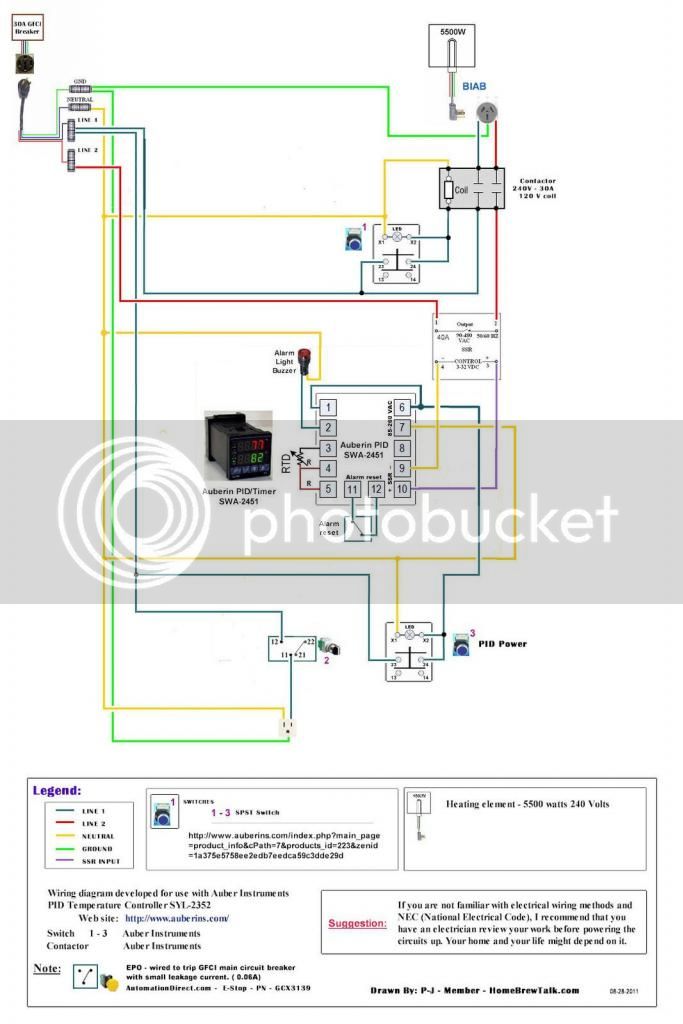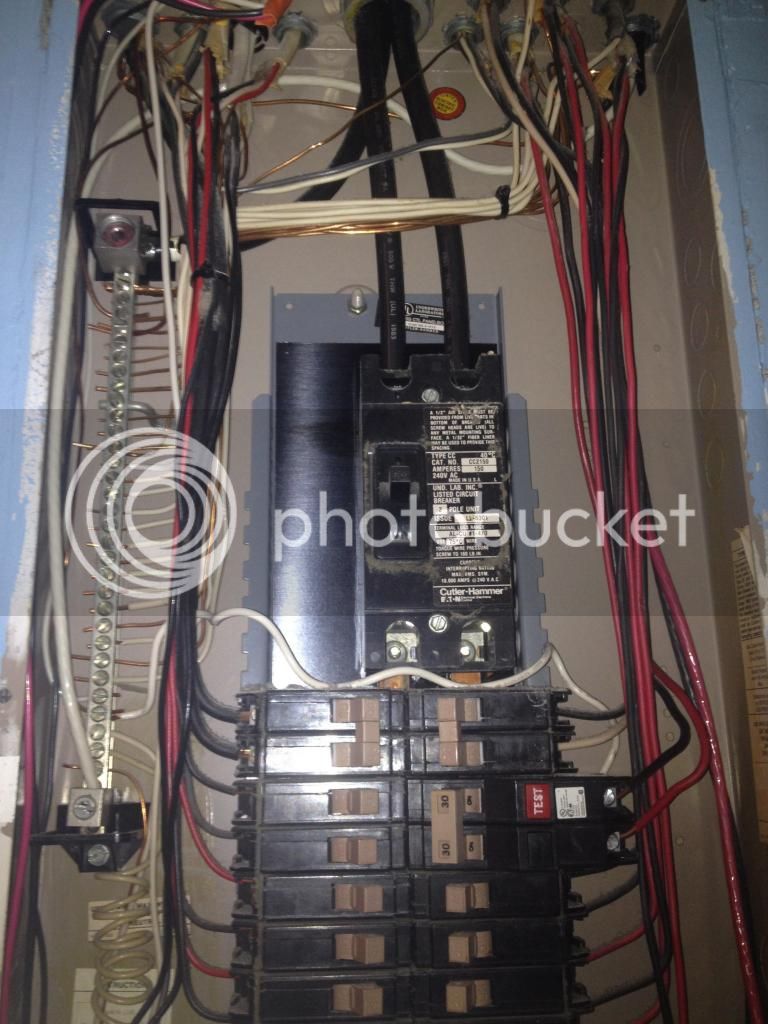You are using an out of date browser. It may not display this or other websites correctly.
You should upgrade or use an alternative browser.
You should upgrade or use an alternative browser.
Beginner control panel help please.. GFCI breaker trips immediately
- Thread starter Bwerner
- Start date

Help Support Homebrew Talk:
This site may earn a commission from merchant affiliate
links, including eBay, Amazon, and others.
GFCI breaker neutral is bonded with ground in main panel bus bar
Thats not what I asked... Where is the white wire landed that goes to your outlet for the panel? Is it on the bus bar or is it on the breaker?
Did you ever check the gfci breaker wires to see if they are set up properly. The most common cause of a 240v gfci breaker tripping as soon as power is applied through it is the load nuetral is bonded to the buss bar. It NEEDS to be on the load nuetral of the breaker itself. Very common issue. The permanent white wire coming out of the breaker goes to nuetral buss bar. Nuetral wire from your controller outlet goes to load nuetral on the breaker.
Thats what I was getting to. You might want to look into getting a refund from the electrician you hired.
trimixdiver1
Well-Known Member
Ha ha, cause no one has wire running through wood in thier house right?
Those cables are approved for that use, using wood as an enclosure is almost the dumbest thing I've seen in a while, the dumbest is your comment.
trimixdiver1
Well-Known Member
Thats not what I asked... Where is the white wire landed that goes to your outlet for the panel? Is it on the bus bar or is it on the breaker?
Thats what I was getting to. You might want to look into getting a refund from the electrician you hired.
That's what I said back on page 2
Minbari
Well-Known Member
- Joined
- Apr 29, 2014
- Messages
- 376
- Reaction score
- 61
Those cables are approved for that use, using wood as an enclosure is almost the dumbest thing I've seen in a while, the dumbest is your comment.
That is your opinion. Been making enclosures out of wood for 15 years. Never had a fire yet. If you dont like my methods fine, didnt ask for your approval.
trimixdiver1
Well-Known Member
That is your opinion. Been making enclosures out of wood for 15 years. Never had a fire yet. If you dont like my methods fine, didnt ask for your approval.
Hey I let the whole thing go until your comment about why approved wire is run through wood. Quit playing the victim.

$176.97
1pc Commercial Keg Manifold 2" Tri Clamp,Ball Lock Tapping Head,Pressure Gauge/Adjustable PRV for Kegging,Fermentation Control
hanhanbaihuoxiaoshoudian

$58.16
HUIZHUGS Brewing Equipment Keg Ball Lock Faucet 30cm Reinforced Silicone Hose Secondary Fermentation Homebrew Kegging Brewing Equipment
xiangshuizhenzhanglingfengshop

$7.79 ($7.79 / Count)
Craft A Brew - LalBrew Voss™ - Kveik Ale Yeast - For Craft Lagers - Ingredients for Home Brewing - Beer Making Supplies - (1 Pack)
Craft a Brew

$33.99 ($17.00 / Count)
$41.99 ($21.00 / Count)
2 Pack 1 Gallon Large Fermentation Jars with 3 Airlocks and 2 SCREW Lids(100% Airtight Heavy Duty Lid w Silicone) - Wide Mouth Glass Jars w Scale Mark - Pickle Jars for Sauerkraut, Sourdough Starter
Qianfenie Direct

$10.99 ($31.16 / Ounce)
Hornindal Kveik Yeast for Homebrewing - Mead, Cider, Wine, Beer - 10g Packet - Saccharomyces Cerevisiae - Sold by Shadowhive.com
Shadowhive

$53.24
1pc Hose Barb/MFL 1.5" Tri Clamp to Ball Lock Post Liquid Gas Homebrew Kegging Fermentation Parts Brewer Hardware SUS304(Liquid Hose Barb)
yunchengshiyanhuqucuichendianzishangwuyouxiangongsi
![Craft A Brew - Safale S-04 Dry Yeast - Fermentis - English Ale Dry Yeast - For English and American Ales and Hard Apple Ciders - Ingredients for Home Brewing - Beer Making Supplies - [1 Pack]](https://m.media-amazon.com/images/I/41fVGNh6JfL._SL500_.jpg)
$6.95 ($17.38 / Ounce)
$7.47 ($18.68 / Ounce)
Craft A Brew - Safale S-04 Dry Yeast - Fermentis - English Ale Dry Yeast - For English and American Ales and Hard Apple Ciders - Ingredients for Home Brewing - Beer Making Supplies - [1 Pack]
Hobby Homebrew

$44.99
$49.95
Craft A Brew - Mead Making Kit – Reusable Make Your Own Mead Kit – Yields 1 Gallon of Mead
Craft a Brew

$22.00 ($623.23 / Ounce)
AMZLMPKNTW Ball Lock Sample Faucet 30cm Reinforced Silicone Hose Secondary Fermentation Homebrew Kegging joyful
无为中南商贸有限公司

$53.24
1pc Hose Barb/MFL 1.5" Tri Clamp to Ball Lock Post Liquid Gas Homebrew Kegging Fermentation Parts Brewer Hardware SUS304(Liquid Hose Barb)
Guangshui Weilu You Trading Co., Ltd

$20.94
$29.99
The Brew Your Own Big Book of Clone Recipes: Featuring 300 Homebrew Recipes from Your Favorite Breweries
Amazon.com
Before I mess with the brew controller any further I'd like to get this breaker figured out..
I have a 30a breaker with neutral connected to the bus bar. As maxkling asked, it appears that neutral to receptacle is landed on another spot on the bus bar, definitely not directly to the breaker.
Main Panel
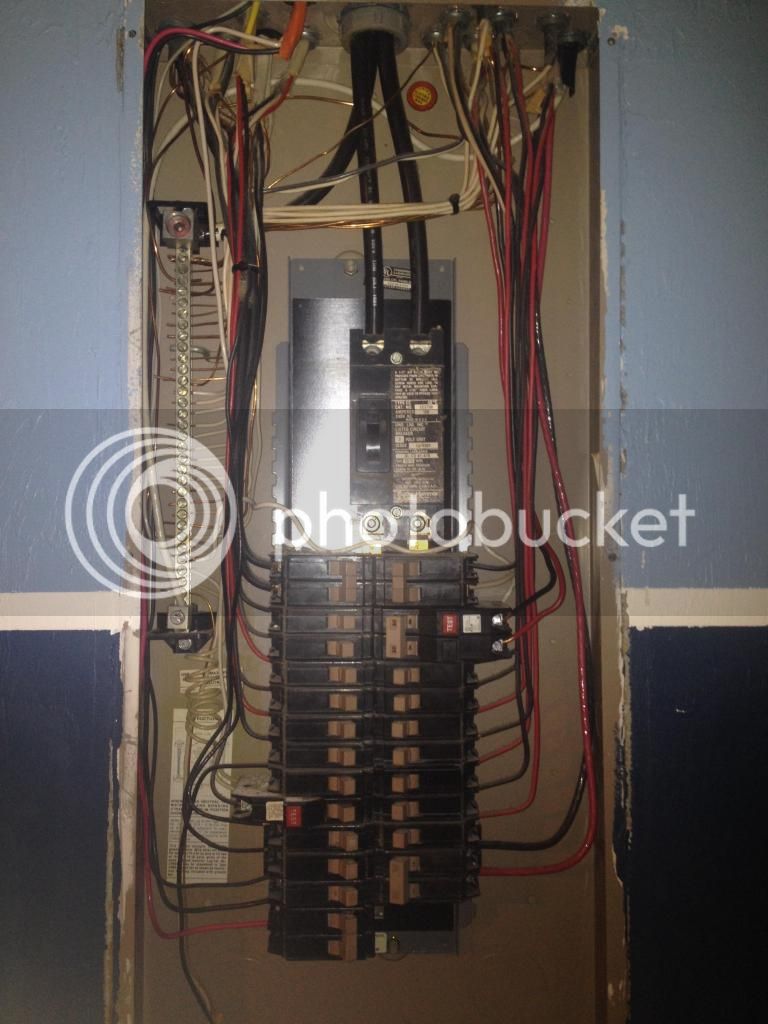
GFCI breaker with neutral in back
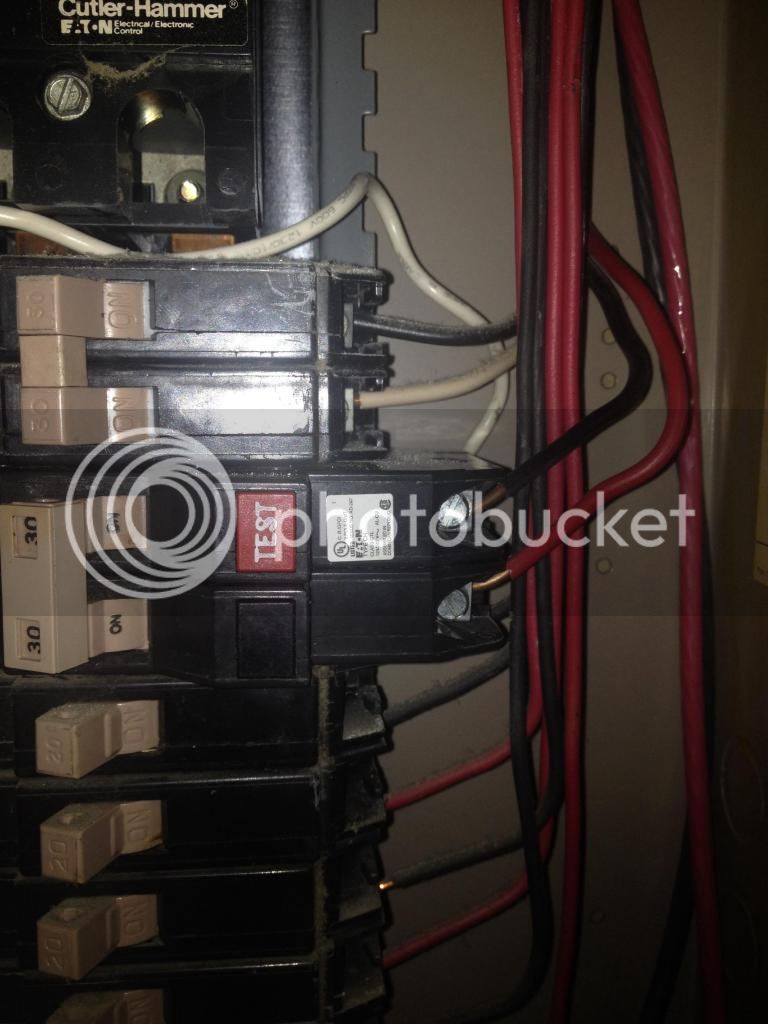
GFCI neutral 4th from bottom
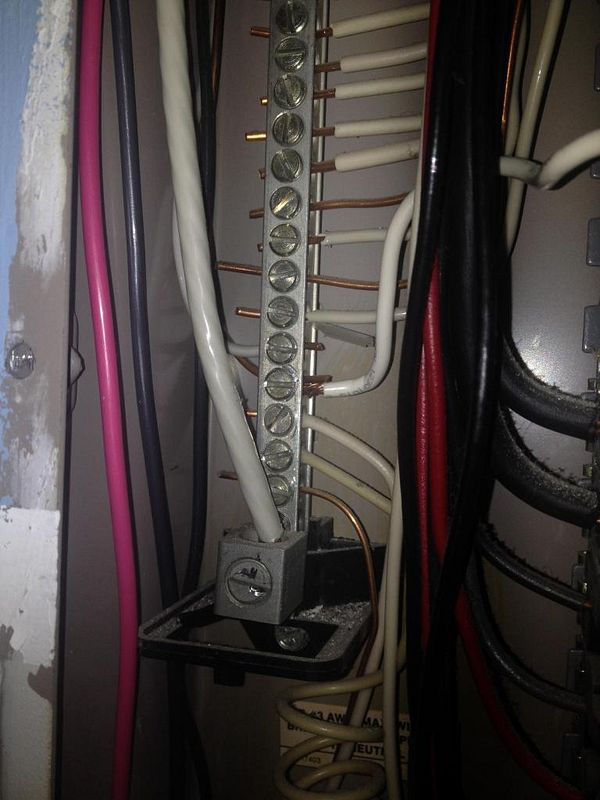
Edit: will repost pic
I have a 30a breaker with neutral connected to the bus bar. As maxkling asked, it appears that neutral to receptacle is landed on another spot on the bus bar, definitely not directly to the breaker.
Main Panel

GFCI breaker with neutral in back

GFCI neutral 4th from bottom

Edit: will repost pic
trimixdiver1
Well-Known Member
Yeah. It looks like you got boned by your electrician. There should be two white wires connected to your GFCI.
Correct, the pigtail that is part of the breaker will land on your neutral buss bar in the panel, the neutral for your panel should be connected to the lug next to the pigtail on the breaker.

Look at the pic, it's a single pole cutler hammer CH breaker, same type as yours, the lug closest to the white neutral is where the load neutral will go. The breaker has to see the neutral and hot so it can sense an imbalance. If the neutral to your panel is connected to the same buss bar as your breaker, your not connected correctly.
Simple fix, just turn off the GFCI breaker, unscrew the two lugs for the hots, trip the damn wire (there is a strip length on the side of the breaker, disconnect and move the neutral from your panel to the lower lug on the breaker, reconnect the hots in their lugs making sure the bare conductor doesn't show like it did. The breaker pigtail is poor workmanship, I would disconnect it from the buss bar and get a length of 10awg and run it from the buss bar down and up to the right side of the panel and connect it via a wire nut.
ingchr1
Well-Known Member
Maybe there's something I'm missing or it's not shown in the photo of your panel, but is there a grounding electrode conductor in the panel? There should be a larger ground wire from panel ground to earth ground.
trimixdiver1
Well-Known Member
Maybe there's something I'm missing or it's not shown in the photo of your panel, but is there a grounding electrode conductor in the panel? There should be a larger ground wire from panel ground to earth ground.
Jesus, good catch! To the OP, please verify there is a 6awg or 4awg ground wire, it will be bare and larger than the others. Also verify it exits the house in a continuous run to two ground rods that are 8ft apart.
And while your at it, add a ground buss to that panel. Is this a sub panel?
ingchr1
Well-Known Member
The three coming in from utility are hot, hot and neutral.This is the main panel, I don't think I'm seeing the grounding electrode unless it is one of the 3 main black wires coming in...?
I'd get an electrician, not the one who installed your GFCI, come and take a look and properly ground your system.
trimixdiver1
Well-Known Member
The three coming in from utility are hot, hot and neutral.
I'd get an electrician, not the one who installed your GFCI, come and take a look and properly ground your system.
Are you in an apartment or multi dwelling house?
I agree, before you start putting electricity in water, get a proper ground. Even though a GFCI doesn't need a ground.
ingchr1
Well-Known Member
This would be good to know, I made an assumption that this panel is feed directly from utility, which it may not be.Are you in an apartment or multi dwelling house?
trimixdiver1
Well-Known Member
This would be good to know, I made an assumption that this panel is feed directly from utility, which it may not be.
Yea but a ground is still required. Just may be easier to run if there is an existing code compliant ground system in place.
ingchr1
Well-Known Member
Good to know. I thought it would be, but wasn't 100% sure without the code book in front of me.Yea but a ground is still required. Just may be easier to run if there is an existing code compliant ground system in place.
Are you in an apartment or multi dwelling house?
I agree, before you start putting electricity in water, get a proper ground. Even though a GFCI doesn't need a ground.
I'm in a single family house... so, there is no ground rod installed?
trimixdiver1
Well-Known Member
I'm in a single family house... so, there is no ground rod installed?
Negative, I was hoping for the later because there may have been a grounding system in place going to other panels in the apartment or complex and you would only have to run a ground from that.
Your a different story... Is this a new house, meaning is this the original panel?
If this is a replacement panel there may be a ground installed that needs to be run and connected to your panel. Even then it will need to be compliant with today's code. So 2 8ft ground rods driven in the ground 8ft or more apart with a 4 or 8awg continuous ground wire to the panel, as well as your water meter if your plumbing is metallic, back to the panel as well.
I think either way, you should get this fixed before you worry about brewing. Having no ground in your home is dangerous and might be lethal. Look at it this way, at the very least you found a major wiring fault that could have gotten ugly.
- Joined
- Apr 11, 2013
- Messages
- 376
- Reaction score
- 61
I found this article for the OP. It is great at explaining what Trimixdiver1 is trying to convey. To the OP, this would only take about 5 min to read and it will be worth your time to help understand what is really going on with an electrical system and the importance of grounding.
http://www.ashireporter.org/HomeInspection/Articles/The-Word-Grounding-and-Bonding/1906#WordE3501-02.jpg
About 2/3 of the way down it talks about A home’s grounding system specifically. So this is what you are looking for, or when you hire an electrician this is what they should be doing for you.
http://www.ashireporter.org/HomeInspection/Articles/The-Word-Grounding-and-Bonding/1906#WordE3501-02.jpg
About 2/3 of the way down it talks about A home’s grounding system specifically. So this is what you are looking for, or when you hire an electrician this is what they should be doing for you.
trimixdiver1
Well-Known Member
I found this article for the OP. It is great at explaining what Trimixdiver1 is trying to convey. To the OP, this would only take about 5 min to read and it will be worth your time to help understand what is really going on with an electrical system and the importance of grounding.
http://www.ashireporter.org/HomeIns...d-Grounding-and-Bonding/1906#WordE3501-02.jpg
About 2/3 of the way down it talks about A homes grounding system specifically. So this is what you are looking for, or when you hire an electrician this is what they should be doing for you.
Thanks man, sometimes I lack the tact to talk to those who are beginning in this area.
I found this article for the OP. It is great at explaining what Trimixdiver1 is trying to convey. To the OP, this would only take about 5 min to read and it will be worth your time to help understand what is really going on with an electrical system and the importance of grounding.
http://www.ashireporter.org/HomeInspection/Articles/The-Word-Grounding-and-Bonding/1906#WordE3501-02.jpg
About 2/3 of the way down it talks about A homes grounding system specifically. So this is what you are looking for, or when you hire an electrician this is what they should be doing for you.
Thanks, I am reading this right now. I understand the importance of the ground but I guess I just assumed the house had one installed, I'm pretty shocked that there was no ground rod this entire time I've lived here. I had an electrician run a spa panel to a shed in my backyard several years ago (bottom right breaker) and he didn't notice the lack of a grounding rod either.
I'm calling the electrician first thing tomorrow morning to get this straightened out. In the meantime, I've rewired the brew control panel according to spkguitar's schematic. I'm fairly confident everything is wired correctly this time but please point out anything I might have overlooked. I will post a status after I speak with the electrician.
You guys are the best, I'm not home free yet but I was ready to pull my hair out 5 days ago.



trimixdiver1
Well-Known Member
Just think of the knowledge you gained in the past 48 hrs. Your panel looks so much better too.
Let us know what you find out about the lack of a ground.
Let us know what you find out about the lack of a ground.
- Joined
- Apr 11, 2013
- Messages
- 376
- Reaction score
- 61
Right on. Actually I think this would be very relevant for many to read because many have an improper concept of what "ground" actually is. Understanding the difference between 'grounding' and 'grounded' is not complex, but that understanding can help tremendously if one were messing around with electricity.
What I don't know is when the grounding electrode became required for buildings. So I believe many older homes do not have this safety feature. Likewise the simple concept of having a grounding conductor in homes didn't become standard practice until the late 1960s. So if you live in a home built prior to 1968 (I believe) you may still have a non-grounding electrical system. Or the difference between having a two prong plug and a three prong plug.
Rather than scare Bwerner into thinking that something is terribly wrong with his homes electrical I would say that his home was most likely built to the standard of its time, but those standards may not meet the latest and greatest.
So without becoming to long winded, with regard to the original question it looks like your GFCI breaker is your problem looking through the last few posts. Once you get that resolved your panel will 'most likely' work.
BTW your wiring looks much better IMO. I can't tell if everything is totally correct but it looks good without my getting in depth with tracing every wire. With this being your first panel build there is a very steep learning curve to conquer. Hopefully you have learned a lot along the way so if you should endeavor to build something similar in the future you know some pitfalls to watch out for before you start.
Once again, good luck.
[edit]
Found it for anyone interested. A short list of when some electrical items become required for buildings. Way earlier than I expected actually. Looks like 1913 was when it became required that electrical systems have grounding. This is counter to what I wrote above but I left that in tact just because.
Here is the link https://www.dli.mn.gov/ccld/PDF/eli_GFCI_history.pdf
Also for recepticals the date was 1962 (Instead of 1968) where plugs became required to have a ground conductor.
What I don't know is when the grounding electrode became required for buildings. So I believe many older homes do not have this safety feature. Likewise the simple concept of having a grounding conductor in homes didn't become standard practice until the late 1960s. So if you live in a home built prior to 1968 (I believe) you may still have a non-grounding electrical system. Or the difference between having a two prong plug and a three prong plug.
Rather than scare Bwerner into thinking that something is terribly wrong with his homes electrical I would say that his home was most likely built to the standard of its time, but those standards may not meet the latest and greatest.
So without becoming to long winded, with regard to the original question it looks like your GFCI breaker is your problem looking through the last few posts. Once you get that resolved your panel will 'most likely' work.
BTW your wiring looks much better IMO. I can't tell if everything is totally correct but it looks good without my getting in depth with tracing every wire. With this being your first panel build there is a very steep learning curve to conquer. Hopefully you have learned a lot along the way so if you should endeavor to build something similar in the future you know some pitfalls to watch out for before you start.
Once again, good luck.
[edit]
Found it for anyone interested. A short list of when some electrical items become required for buildings. Way earlier than I expected actually. Looks like 1913 was when it became required that electrical systems have grounding. This is counter to what I wrote above but I left that in tact just because.
Here is the link https://www.dli.mn.gov/ccld/PDF/eli_GFCI_history.pdf
Also for recepticals the date was 1962 (Instead of 1968) where plugs became required to have a ground conductor.
trimixdiver1
Well-Known Member
Right on. Actually I think this would be very relevant for many to read because many have an improper concept of what "ground" actually is. Understanding the difference between 'grounding' and 'grounded' is not complex, but that understanding can help tremendously if one were messing around with electricity.
What I don't know is when the grounding electrode became required for buildings. So I believe many older homes do not have this safety feature. Likewise the simple concept of having a grounding conductor in homes didn't become standard practice until the late 1960s. So if you live in a home built prior to 1968 (I believe) you may still have a non-grounding electrical system. Or the difference between having a two prong plug and a three prong plug.
Rather than scare Bwerner into thinking that something is terribly wrong with his homes electrical I would say that his home was most likely built to the standard of its time, but those standards may not meet the latest and greatest.
So without becoming to long winded, with regard to the original question it looks like your GFCI breaker is your problem looking through the last few posts. Once you get that resolved your panel will 'most likely' work.
BTW your wiring looks much better IMO. I can't tell if everything is totally correct but it looks good without my getting in depth with tracing every wire. With this being your first panel build there is a very steep learning curve to conquer. Hopefully you have learned a lot along the way so if you should endeavor to build something similar in the future you know some pitfalls to watch out for before you start.
Once again, good luck.
[edit]
Found it for anyone interested. A short list of when some electrical items become required for buildings. Way earlier than I expected actually. Looks like 1913 was when it became required that electrical systems have grounding. This is counter to what I wrote above but I left that in tact just because.
Here is the link https://www.dli.mn.gov/ccld/PDF/eli_GFCI_history.pdf
Also for recepticals the date was 1962 (Instead of 1968) where plugs became required to have a ground conductor.
Back then things were bonded and not grounded. There is a difference. His panel is not old at all and would fall into the post bonding timeframe. With new technology power supplies, you need a ground. It's not an option anymore. The JHA will be the ultimate authority as to what is allowed.
ahem..... shot down in flames for being an id10t for a wooden enclosure...... ERRM, YESBack then things were bonded and not grounded. There is a difference.
You don't know me but I'm one of the very few people on here who even knows what a "walking beam" and a "one-shot" is regards PLC programming and automation control cause I'm one of the few that have actually programmed the crap out of them in both nuclear and industrial application control applications
Now we get to one of the cruxes of the primary issue... ground it properly! oh damn, did I say that a few posts ago (post #47)?
I would venture a guess that what is coming to the neutral bar is the ground. It is that way with mine. The power company provides me with two hots and no neutral. I have to provide a ground which doubles as my neutral. I believe they call floating neutral.
trimixdiver1
Well-Known Member
I would venture a guess that what is coming to the neutral bar is the ground. It is that way with mine. The power company provides me with two hots and no neutral. I have to provide a ground which doubles as my neutral. I believe they call floating neutral.
So you have only two wires coming from the transformer? Weird, usually the center tap is the neutral. And the neutral conductor in the triplex acts as the messenger to provide support to the two hots.
Similar threads
- Replies
- 20
- Views
- 912
- Replies
- 14
- Views
- 3K
- Replies
- 4
- Views
- 1K




































